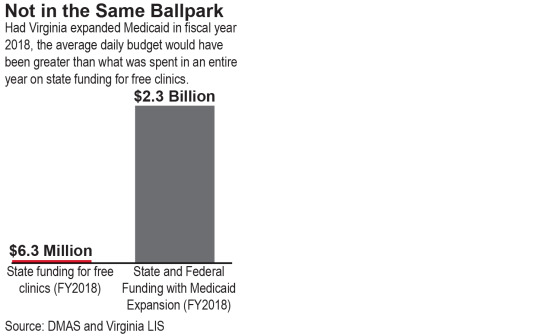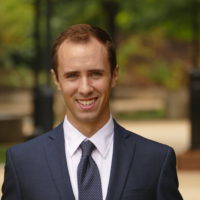May 17, 2017
Smoke and Mirrors Arguments: Debunking the Idea that Free Clinics are Substitutes for Medicaid Expansion
During this recent legislative session, lawmakers argued over an amendment that would have effectively led to Medicaid expansion later this year. Lawmakers against expansion noted that the state already has a safety-net for those without health coverage. It’s called free clinics. These lawmakers chose to employ the following logic to their arguments: the legislature recently increased state funding for free clinics, the system works very well as a safety-net, and therefore expansion is not necessary.
The reality is that there is no equivalency between these two essential safety-net programs, given the vast disparities in scale and scope of the services provided by each.
Lawmakers are correct to cite that they increased state funding for free clinics by $3.1 million in the 2015-2016 biennium budget. This upcoming fiscal year, state funding for free clinics will be $6.3 million. Yet under Medicaid expansion, $2.3 billion would have been spent over the same period, 94 percent of which would have been paid for by the federal government.

While free clinics do an outstanding job providing vital services to 75,000 low-income uninsured adults each year in Virginia, Medicaid expansion could provide continual coverage to hundreds of thousands of low-income Virginians – allowing many to see primary care physicians for the first time and seek preventative services instead of emergency care. Many free clinics are stretched to their limits throughout the state, have long waiting lists, and have to employ lottery systems for patients to receive essential care.
Medicaid expansion and free clinics are not substitutes for each other, but they could be complements – as we’re starting to see in several expansion states.
Even if Medicaid expansion were passed, free clinics play an important role covering services that Medicaid does not and offering coverage to Virginians who would continue to face barriers to health insurance access.
While Medicaid provides high quality coverage for most medical issues, it does not cover certain essential services for adults like dental or optometric care. Currently, only half of Virginia’s counties have a dental safety-net clinics. In addition, increasing the number of Virginians with Medicaid coverage would allow free clinics to further supplement critical mental health and care coordination services. So even with Medicaid expansion, free clinics would continue to play an important role as a stopgap for low-income individuals that can’t afford many of these essential services.
Medicaid expansion would also allow free clinics to focus more on providing services to a smaller subset of people who would continue to not qualify for Medicaid. This includes Virginians who have incomes above 138 percent of the federal poverty level – $20,420 for a family of three – and lawfully present immigrants who don’t have 10 years of work experience in the U.S.
Increasing the share of low-income Virginians who have access to health insurance would also help the bottom line of Virginia’s community health centers (also known as Federally Qualified Health Centers), which serve both insured and uninsured Virginians. That’s because it would increase the share of their clients for whom the health centers can receive reimbursement for services, allowing them to free up other scarce resources to serve their patients who remain uninsured.
Medicaid expansion in fiscal year 2018 would lead to an estimated net savings of $73 million for the state budget (that’s not including the millions in revenue generated from the tens of thousands of well-paying jobs that would be created). This savings could provide funding for services that free clinics provide and Medicaid does not cover, like expanding free clinics that offer dental and optometry services. In turn, Medicaid expansion could serve to strengthen Virginia’s health care safety-net providers and lead to uninsured Virginians being provided a wider array of essential medical care.
The free clinic network in Virginia continues to provide critical safety-net services to many of Virginia’s uninsured, even as the state has neglected to pass Medicaid expansion.
Yet, each year, free clinics in Virginia struggle more and more to finance their operations. Last year, Virginia free clinics provided $230 million in mental health, primary care, dental, medication and lab services. While the $3.1 million increase in state funding a couple years ago helps free clinics do important work, lawmakers should hardly be making the case that this small increase removes the need for expanding Medicaid. It’s time for the state to do its job protecting some of its most vulnerable residents. It’s time to make the fiscally responsible decision to expand Medicaid and relieve the pressure from our state’s overwhelmed, but vital free clinic network.
Category:
Health Care
